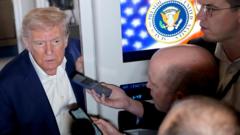On Saturday, the Trump administration announced that smartphones, computers, and various electronic devices will be exempt from newly imposed "reciprocal" tariffs, including an eye-watering 125% duty on Chinese imports. This development, confirmed by US Customs and Border Patrol, marks a groundbreaking moment in the ongoing trade war, providing significant relief for tech companies worried about rising gadget prices due to tariffs.
Traveling to Miami, Trump indicated that further details regarding these exemptions will be shared early next week. "We'll be very specific," he said while on Air Force One. "As a country we're taking in a lot of money," emphasizing the financial benefits the tariffs have brought to the US.
These exemptions, which revert back to April 5, also encompass additional electronic components such as semiconductors, solar cells, and memory cards. The decision is described by trade analysts as a "game-changer" for the tech sector. Dan Ives, a top tech analyst at Wedbush Securities, stated on social media that the exemption of smartphones and chips from tariffs is a significant positive shift for tech investors.
Major tech players like Apple, Nvidia, and Microsoft can breathe a sigh of relief. White House Press Secretary Karoline Leavitt underscored that the exemptions aim to provide companies the necessary time to relocate manufacturing closer to home. “President Trump has made it clear America cannot rely on China to manufacture critical technologies,” she stated, highlighting the urgency for US-based production.
Currently, these electronic products remain subject to a separate 20% tariff tied to fentanyl imports from China, as noted by White House Deputy Chief of Staff Stephen Miller. Reports have suggested that iPhone prices in the US could have surged as much as threefold if manufacturers were forced to pass tariffs directly onto consumers.
The US is a major market for Apple's iPhones, with estimates showing that about 80% of its devices intended for the US market are manufactured in China. Additionally, Apple, alongside Samsung, has sought to diversify its supply chains recently to mitigate risks from potential over-dependence on Chinese manufacturing, with India and Vietnam emerging as prospective production hubs.
Earlier, Trump had announced plans for steep tariffs that would have impacted countries across the globe this week. However, he subsequently decided on a 90-day deferment of these tariffs for nations that did not retaliate against US tariffs—except for China, which has seen increased tariffs rise to 145% due to its anticipated retaliatory measures. Trump has claimed that these tariffs are designed to address imbalances in the global trading system while also bringing jobs back to American soil.
Traveling to Miami, Trump indicated that further details regarding these exemptions will be shared early next week. "We'll be very specific," he said while on Air Force One. "As a country we're taking in a lot of money," emphasizing the financial benefits the tariffs have brought to the US.
These exemptions, which revert back to April 5, also encompass additional electronic components such as semiconductors, solar cells, and memory cards. The decision is described by trade analysts as a "game-changer" for the tech sector. Dan Ives, a top tech analyst at Wedbush Securities, stated on social media that the exemption of smartphones and chips from tariffs is a significant positive shift for tech investors.
Major tech players like Apple, Nvidia, and Microsoft can breathe a sigh of relief. White House Press Secretary Karoline Leavitt underscored that the exemptions aim to provide companies the necessary time to relocate manufacturing closer to home. “President Trump has made it clear America cannot rely on China to manufacture critical technologies,” she stated, highlighting the urgency for US-based production.
Currently, these electronic products remain subject to a separate 20% tariff tied to fentanyl imports from China, as noted by White House Deputy Chief of Staff Stephen Miller. Reports have suggested that iPhone prices in the US could have surged as much as threefold if manufacturers were forced to pass tariffs directly onto consumers.
The US is a major market for Apple's iPhones, with estimates showing that about 80% of its devices intended for the US market are manufactured in China. Additionally, Apple, alongside Samsung, has sought to diversify its supply chains recently to mitigate risks from potential over-dependence on Chinese manufacturing, with India and Vietnam emerging as prospective production hubs.
Earlier, Trump had announced plans for steep tariffs that would have impacted countries across the globe this week. However, he subsequently decided on a 90-day deferment of these tariffs for nations that did not retaliate against US tariffs—except for China, which has seen increased tariffs rise to 145% due to its anticipated retaliatory measures. Trump has claimed that these tariffs are designed to address imbalances in the global trading system while also bringing jobs back to American soil.



















